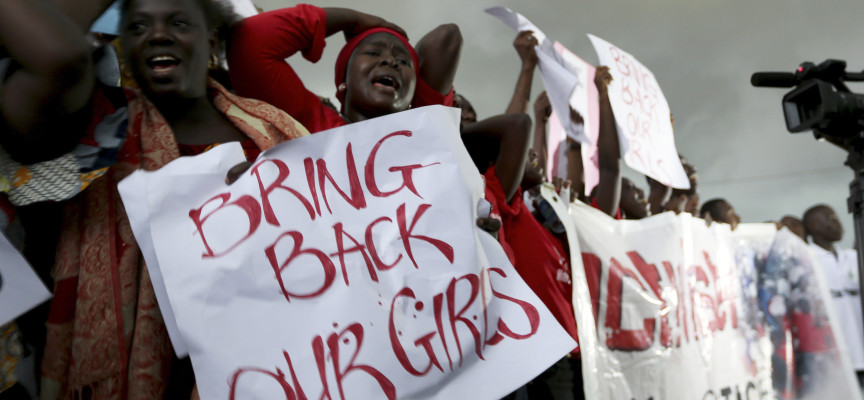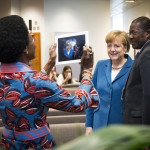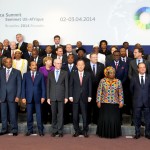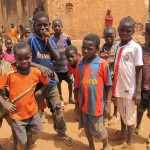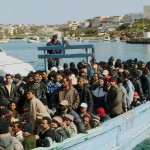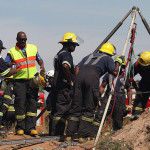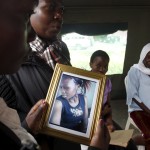“Bring back our girls”. It’s the slogan which is getting around the whole world to call attention to the destiny of the over two hundred schoolgirls kidnapped in the north of Nigeria by Boko Haram militants. Thanks to the engagement of TV stars and political leaders this slogan has succeeded in drawing the attention of the media on a crisis which has stayed in the news background too long. This crisis runs the risk of destabilizing a Nation that is important for its economy, demography and politics, and its consequences could be felt much farther than Nigerian borders.
Fully aware of this is President Hollande: last Saturday, 17th of May, he invited in Paris the Presidents of the nations of the region, together with the representatives of U.S., Great Britain and European Union, in order to try to face all together a faction more and more connected to other jihadist movements operating in Sahel.
What is happening these days on the political front and in the public opinion is undoubtedly a positive message, but it also offers the occasion to reflect on the differences which mark the way in which Europe considers African affairs.
As far as the political challenge is concerned, the risk is to keep on concentrating on the consequences of crises more than on their causes, intervening – often arbitrarily – when it is too late. It is in fact clear that it is not possible to separate the fight against the diffusion of extreme Islam (to the detriment of Islamic groups coexisting for centuries with Christian communities and traditional religions) from the fight against poverty and from the access to primary goods, such as food, health and instruction. It is a chronic poverty in which movements as Boko Haram succeed in taking roots more easily, thanks also to capitals coming from illegal trade and secret financing.
The case of Libya is a prime one: according to Intelligence sources, from this nation come part of Boko Haram’s weapons. Europe is partly responsible for the Libyan chaos, but it seems to have forgotten it.
In the end, a hint at the media world. The case “Bring back our girls” demonstrate how the information about African events is still too often occasional and filled with stereotypes which do not help to understand the complexity of the circumstances in action on the continent. Exceptions are nations such as France and the United Kingdom, where the long colonial experience and the interests still present in the field help to keep attention high.
In the past other crises, such as the Biafra one, or big events, such as “LiveAid” had drawn the attention on Africa.
Time has come for Europe to come out of this short circuit to tell of a changing continent, where crises are the exception and not the rule.
Moreover, let us not forget the humanitarian tragedies taking place before our inattentive eyes in South Sudan, Mali and the Central African Republic. African and European journalists do not get tired of telling about these crises, even at the risk of their life. One of them is the young French photographer Camille Lepage, killed last week in the Central African Republic. She was 26. A death that has been too quickly set aside, as the ones of so many, too many, African civilians.
“Bring back our girls”. È questo lo slogan che sta facendo il giro del mondo per richiamare l’attenzione sulla sorte delle oltre duecento studentesse rapite nel nord della Nigeria dai miliziani di Boko Haram. Uno slogan che, grazie al coinvolgimento di star televisive e leader politici, ha saputo accendere, anche in Europa, i riflettori dei media su una crisi rimasta per troppo tempo ai margini della cronaca. Una crisi che rischia di destabilizzare un Paese che, per la sua importanza economica, demografica e politica, potrebbe avere ripercussioni ben oltre i confini della Nigeria.
Lo sa bene il presidente francese Hollande che, sabato 17 maggio, ha invitato a Parigi i presidenti degli Stati della regione insieme ai rappresentanti di Stati Uniti, Gran Bretagna e Unione Europea per cercare di far fronte comune contro una setta che è sempre più collegata con altri movimenti jihadisti attivi nel Sahel.
Quanto sta avvenendo in questi giorni sul fronte politico e dell’opinione pubblica è senza dubbio un segnale positivo, ma offre anche l’occasione per riflettere sulle anomalie che contraddistinguono il modo in cui l’Europa guarda alle vicende africane.
Per quanto riguarda la sfida politica, il rischio è quello di continuare a concentrarsi sulle conseguenze delle crisi più che sulle loro cause, intervenendo – spesso arbitrariamente – quando ormai è troppo tardi. Perché è ormai chiaro come non si possa scindere la lotta contro la diffusione dell’Islam radicale, a danno di correnti islamiche che da secoli convivono con comunità cristiane e religioni tradizionali, dal contrasto alla povertà e dall’accesso a beni primari come cibo, salute e istruzione. Una povertà cronica in cui movimenti come quello di Boko Haram riescono ad attecchire più facilmente, forti di fondi derivanti da traffici illeciti e da finanziamenti occulti.
Emblematico il caso della Libia, Paese da cui, secondo fonti di intelligence, proviene parte dell’arsenale di Boko Haram. Un caos, quello libico, di cui l’Europa è in parte responsabile, ma di cui sembra essersi dimenticata.
Infine un accenno al mondo dei media. Il caso “Bring back our girls” dimostra come l’informazione sulle vicende africane sia ancora troppo spesso episodica e infarcita di stereotipi che non aiutano a comprendere la complessità dei fenomeni in atto nel continente. Fanno in parte eccezione Paesi come Francia e Regno Unito, dove la lunga storia coloniale e gli interessi tuttora presenti sul terreno aiutano a mantenere alta l’attenzione. In passato ad accendere i riflettori sull’Africa erano state altre crisi, come quella del Biafra, o grandi eventi come il “LiveAid”.
È arrivato il momento per l’Europa di uscire da questo cortocircuito per raccontare un continente in trasformazione dove le crisi sono l’eccezione e non la regola.
Senza dimenticare le tragedie umanitarie che si stanno consumando sotto i nostri occhi distratti in Sud Sudan, Mali e Repubblica Centrafricana. Crisi che giornalisti africani ed europei non si stancano di raccontare, anche a rischio della vita. Tra loro anche la giovane fotografa francese Camille Lepage, uccisa la scorsa settimana in Repubblica Centrafricana. Aveva 26 anni. Una morte archiviata troppo in fretta, come quelle di tanti, troppi, civili africani.
Michele Luppi
www.africaeuropa.it
Latest posts by Michele Luppi (see all)
- How can Europe do that? - 16 aprile 2016
- A raw nerve in european consciousness - 23 luglio 2015
- The cry of the dead of Garissa - 18 aprile 2015

